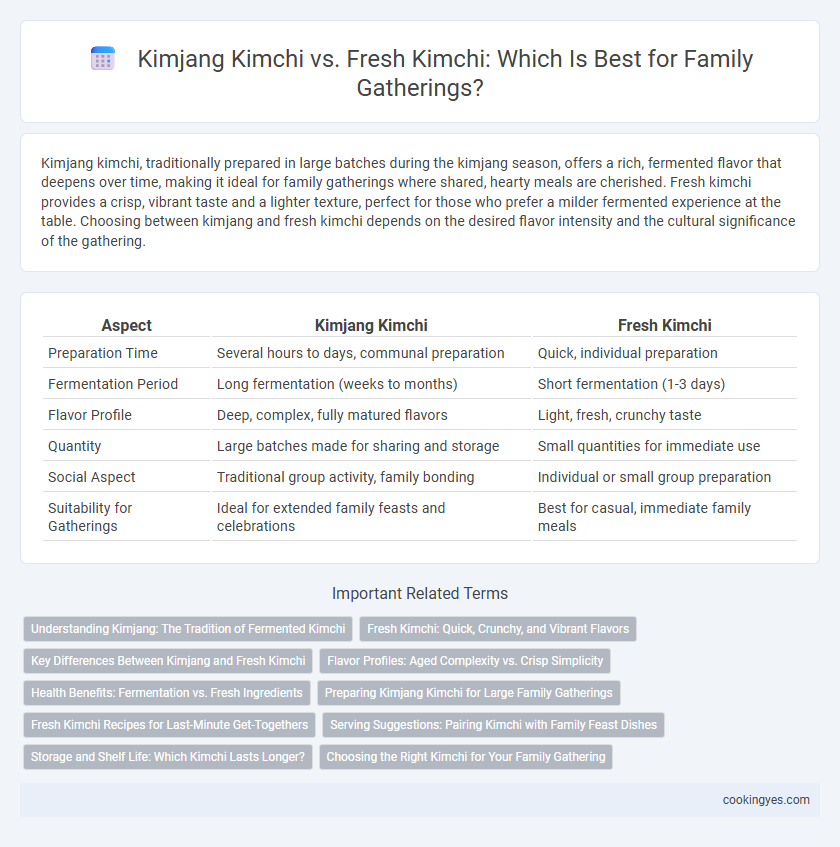Kimjang kimchi, traditionally prepared in large batches during the kimjang season, offers a rich, fermented flavor that deepens over time, making it ideal for family gatherings where shared, hearty meals are cherished. Fresh kimchi provides a crisp, vibrant taste and a lighter texture, perfect for those who prefer a milder fermented experience at the table. Choosing between kimjang and fresh kimchi depends on the desired flavor intensity and the cultural significance of the gathering.
Table of Comparison
| Aspect | Kimjang Kimchi | Fresh Kimchi |
|---|---|---|
| Preparation Time | Several hours to days, communal preparation | Quick, individual preparation |
| Fermentation Period | Long fermentation (weeks to months) | Short fermentation (1-3 days) |
| Flavor Profile | Deep, complex, fully matured flavors | Light, fresh, crunchy taste |
| Quantity | Large batches made for sharing and storage | Small quantities for immediate use |
| Social Aspect | Traditional group activity, family bonding | Individual or small group preparation |
| Suitability for Gatherings | Ideal for extended family feasts and celebrations | Best for casual, immediate family meals |
Understanding Kimjang: The Tradition of Fermented Kimchi
Kimjang, the traditional Korean practice of making large batches of fermented kimchi, emphasizes communal preparation that strengthens family bonds during gatherings. Unlike fresh kimchi, which is enjoyed immediately for its crisp texture and mild flavor, Kimjang kimchi undergoes extended fermentation, developing complex, tangy flavors essential for winter consumption. This cultural ritual highlights the importance of patience and collaboration, preserving not only food but also Korean heritage and family unity.
Fresh Kimchi: Quick, Crunchy, and Vibrant Flavors
Fresh kimchi offers a quick and crunchy option for family gatherings, preserving vibrant flavors that enhance the overall dining experience. Its crisp texture and lively taste make it an ideal side dish, providing a refreshing contrast to richer main courses. Unlike Kimjang kimchi, which undergoes long fermentation, fresh kimchi delivers immediate zest and nutritional benefits, perfect for impromptu celebrations.
Key Differences Between Kimjang and Fresh Kimchi
Kimjang kimchi refers to the large-batch, traditional preparation typically done once a year, resulting in well-fermented, deeply flavored kimchi that lasts for months, making it ideal for extended family gatherings and communal sharing. Fresh kimchi, prepared in smaller quantities, offers a crisp texture and milder, fresher taste, perfect for immediate consumption or shorter family meals. The key difference lies in the fermentation duration and production scale, influencing taste intensity, texture, and shelf life, with Kimjang emphasizing preservation and collective tradition.
Flavor Profiles: Aged Complexity vs. Crisp Simplicity
Kimjang kimchi develops a deep, fermented flavor with rich umami and tangy undertones, perfect for enhancing complex dishes during family gatherings. Fresh kimchi offers a bright, crisp texture and a sharper, more vibrant taste, providing a refreshing contrast to heavier meals. Choosing between aged Kimjang kimchi and fresh kimchi depends on whether a robust, matured flavor or a lively, crunchy bite best complements the occasion.
Health Benefits: Fermentation vs. Fresh Ingredients
Kimjang kimchi, aged through traditional fermentation, offers enhanced probiotic benefits that support gut health and strengthen the immune system during family gatherings. Fresh kimchi, while rich in vitamins and enzymes from raw ingredients, provides higher levels of antioxidants and crisp textures that complement immediate consumption. Balancing fermented kimchi's digestive advantages with fresh kimchi's nutrient density maximizes health benefits for communal meals.
Preparing Kimjang Kimchi for Large Family Gatherings
Preparing Kimjang kimchi for large family gatherings involves meticulous planning and communal effort to produce ample quantities of fermented cabbage with rich, balanced flavors. Unlike fresh kimchi, which is made quickly for immediate consumption, Kimjang kimchi undergoes an extended fermentation process, allowing it to develop deep umami notes essential for traditional celebrations. This method ensures the kimchi lasts longer, providing a meaningful cultural experience and a shared bonding activity for families during important seasonal events.
Fresh Kimchi Recipes for Last-Minute Get-Togethers
Fresh kimchi recipes provide a quick and flavorful alternative for last-minute family gatherings, offering vibrant crunch and bright flavors that complement various dishes. Unlike Kimjang, which involves a time-intensive fermentation process ideal for long-term storage, fresh kimchi can be prepared in under an hour using ingredients like napa cabbage, radish, garlic, and chili powder. These recipes enhance spontaneity in Korean culinary traditions, delivering a tangy, spicy bite that enlivens any impromptu celebration.
Serving Suggestions: Pairing Kimchi with Family Feast Dishes
Kimjang kimchi offers a rich, fermented depth that complements hearty family feast dishes such as grilled meats, stews, and rice bowls, enhancing umami and balancing rich flavors. Fresh kimchi provides a crisp, tangy contrast that brightens lighter meals like seafood pancakes, bibimbap, and vegetable side dishes. Both versions serve as versatile accompaniments, elevating traditional Korean family gatherings with authentic, flavorful pairings.
Storage and Shelf Life: Which Kimchi Lasts Longer?
Kimjang kimchi, traditionally prepared in large batches and fermented for extended periods, offers superior shelf life compared to fresh kimchi, often lasting several months when stored properly in cool, airtight containers. Fresh kimchi, with shorter fermentation times, provides a crisp texture and lighter flavor but requires refrigeration and consumption within a few weeks to prevent spoilage. Proper storage at consistent low temperatures, around 4degC (39degF), significantly extends the longevity of both types, making Kimjang kimchi more suitable for long-term family gatherings.
Choosing the Right Kimchi for Your Family Gathering
Kimjang kimchi, traditionally fermented for weeks, offers a deep, complex flavor and ideal for long family gatherings where sharing and tradition are valued. Fresh kimchi, with its crisp texture and milder taste, suits shorter events and family members who prefer less pungent foods. Selecting between kimjang and fresh kimchi depends on the event's duration, the family's fermentation preference, and the desired intensity of flavor.
Kimjang vs Fresh Kimchi for family gatherings Infographic

 cookingyes.com
cookingyes.com